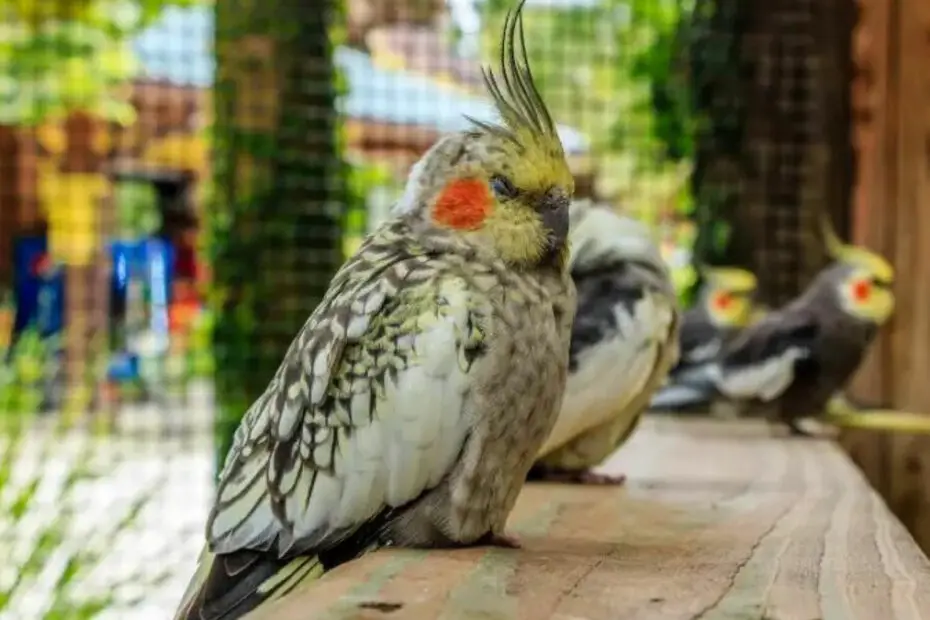Whether you own a cockatiel or other birds, understanding pet bird sleep is important to ensure the complete well-being of the bird. By carefully addressing sleep issues in pet birds, many sleep-related problems can easily be avoided. And that will, in turn, help the bird become healthy and active.
Likewise, learning about cockatiel sleep habits from this guide will be beneficial whether you keep cockatiels or love watching them. Or maybe you are just interested to know about cockatiels in-depth.
All parrots, including cockatiels, will have some problems without enough sleep. Mood swings, weakened immune system, nutritional imbalance and lack of energy are the main problems parrots have when their sleep is incomplete. A cockatiel with mood swings gets irritable and might try to bite.
Moreover, lack of sleep can cause life-threatening diseases. Hence, knowing and maintaining their proper sleep routine is vital to ensure they get a good quality of life.
In this article, we’ll see how cockatiels’ wild sleeping environment is and how to recreate that in captivity. We’ll then talk about the problems a cockatiel may get without proper sleep and finally learn about some ways to help them sleep well.
Cockatiel Sleep Patterns
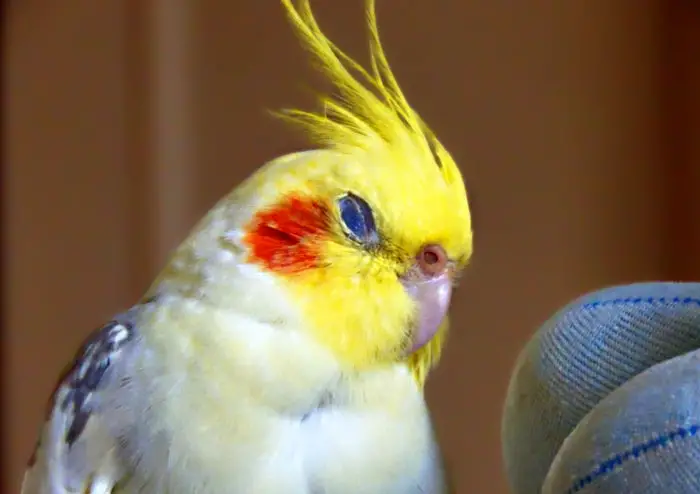
Parrots usually need at least 10-12 hours of deep sleep every day. Since cockatiels are light sleepers, they must take naps for several hours throughout the day.
- Depending on the cockatiel’s age, the nap duration will vary, but essentially their rest combines night sleep and daytime naps
- In the wild, cockatiels will sleep right after sunset
- While captive cockatiels have varying sleep schedules, if the sleep cycle can be kept similar to wild, it’d be the best for them
Maintaining the biological clock, known as the “circadian rhythm/clock,” is the process of going to sleep after sunset and waking up at sunrise. If maintained properly, a cockatiel’s hormone balance and energy levels will remain stable throughout the day.
Parrots in the wild will get to sleep when sunset starts and wake up with the sunrise. This is their natural circadian rhythm or biological clock. In captivity, it’s usually impractical to maintain the timing as most people get to bed hours after sunset and wake up a few hours after sunrise.
The change in captivity from the wild environment can, however, be easily managed with the birds as they’re very adjusting. All you have to do is make sure that the bird gets 12 hours of noise-free, dark room. If that could be maintained, the timing difference won’t be a major issue at all.
Moreover, even though cockatiels have been captive-bred for decades, they still try to mimic their wild characteristics. This is seen in all the cockatiel species and mutations available in the pet trade, which is more than a dozen species.
So, while in captivity, maintaining the right sleep time they get in nature would be quite effective for their well-being.
Common sleep-related issues in Cockatiels and managing their sleep patterns
Cockatiels, if given a noise-free environment, will sleep with ease. There are some common sleep-related problems they get, however. Let’s have a look at those:
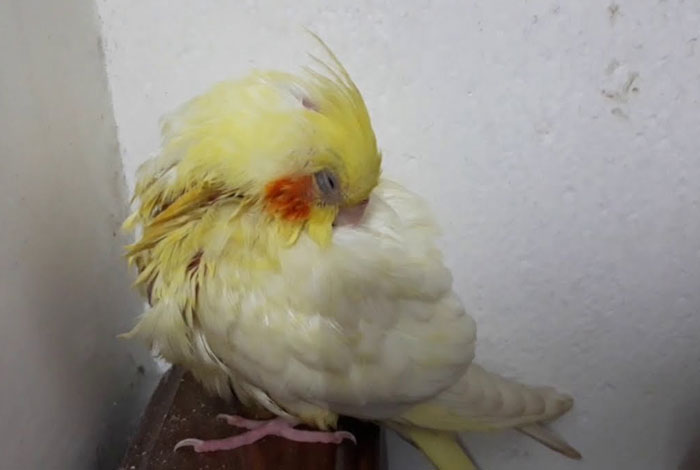
Night Fright
Cockatiels can easily get night frights, meaning if they hear a noise while sleeping, they get scared and flap their wings for a while. This behavior is achieved by their wild family and is helpful while they live in nature. However, in captivity, this is unnecessary and easily avoidable.
Just make sure to place their cage in a place where noises can’t easily reach and have a dim light somewhere near. This’ll prevent night frights.
Excessive Daytime Sleepiness
All cockatiels spend several hours napping in the daytime, especially baby and older cockatiels. This is nothing to worry about. But this can be considered excessive when a bird is seen with nearly zero activity and mostly daytime sleep. This is a sign of the bird’s internal damage or fatigue. Consider seeing your cockatiel to a vet for detailed observation.
How to manage Sleep Patterns for Different Life Stages and Health Conditions in Cockatiels
Following are some tips you can follow to manage a cockatiel’s sleep patterns as it ages.
- All baby parrots need at least 12-14 hours of uninterrupted nighttime sleep and frequent naps throughout the daytime. Other than eating, a bit of playing, and cuddling, the bird will mostly spend shutting its eyes off.
- Not only cockatiels but all adult parrots also require 12 hours of deep sleep at night.
- In the wild, cockatiels sleep from sunset to sunrise, but this can be adjusted in captivity.
- Make the cockatiel’s sleeping room dim to create a sunset-like environment and persuade it to sleep.
- As the cockatiel ages, it’ll nap more often and reduce its overall activity levels. It’ll spend more time cuddling with its owner or cage mate (if there are any).
Creating a Conducive Sleep Environment
Unlike most birds, cockatiels are light sleepers. They can easily get startled by even the softest noises, such as a gust of air hitting their cage at night.
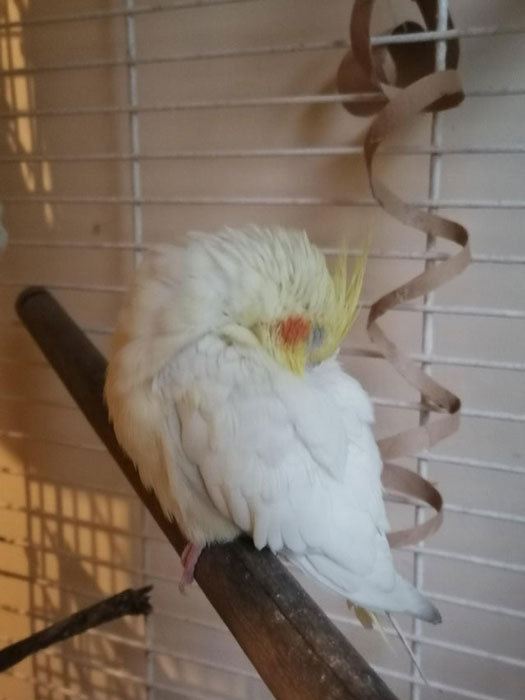
And without getting proper sleep, bird behavior changes. Thus, cockatiels become irritated and will try to bite humans or other bird companions they may have. For these reasons, it’s important to give your pet cockatiel a noise-free, safe sleep environment.
Let’s see how to give a cockatiel a good sleep environment:
Bird Cages and Accessories
Cage size should be at least 24”L, 18”D and 24”H. That’s minimum; you can surely go for a larger one, and in fact, recommended. A large cage helps them to live and sleep inside it comfortably. And, of course, include natural perches inside the cage to recreate cockatiels’ wild environment.
Some people use bird beds, but that’s optional. A few natural wooden perches are enough to mimic a natural environment.
If you place the cage in the corner of the house where it’s quite noisy, you might want to move the cage after the evening. Also, you can give it a smaller, sleeping cage and move the bird inside it when it’s time for it to sleep. Placing a small cage in a silent corner of the house should be easier.
Cockatiels like natural wooden perches to sleep on. As an accessory, you can get this. Some cockatiels will sleep on food bowls, and you might want to get a large food bowl for that reason too.
Bird Health Management
Regularly give the bird vitamins and minerals, especially calcium. Lack of calcium will weaken the cockatiel’s bones, making it too weak to stand on the perch and sleep properly. A healthy bird will have an easier time sleeping.
Light
The darker the environment, the better the bird’s melatonin production will be. So, turn off the lights in the room in which you’ve placed your cockatiel’s cage. Or, you might want to cover the cage with breathable dark-colored fabric.
Now, some people prefer to keep a dim light near the cockatiel cage to make them feel safe. This is effective, especially for their night frights. A sudden noise in a completely dark room will scare a cockatiel more than when it’s in a dimly lit room.
Noise
Keep the door and the windows of the bird room closed. A noise from a slight wind movement is enough to scare these birds off. Moreover, because of being light sleepers makes it even more problematic to keep any sources of noise nearby.
Just a precaution: while keeping the doors and windows closed, ensure the room isn’t too hot. Otherwise, the bird will have a hard time getting some shut-eye.
Promoting Healthy Sleep Behaviors
It’s important that you train your cockatiel to have a consistent sleep schedule for optimal bird health. Doing so is easy. It’s vital for the bird to be active during the morning and afternoon. And they become tired enough in the evening to feel sleepy. Also, complete bird nutrition is necessary for an overall sleep schedule, such as
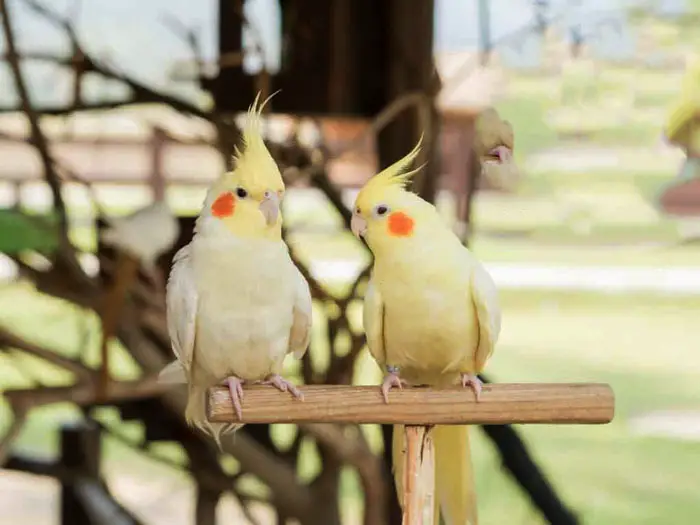
- Make necessary arrangements for the sleep environment for cockatiels, such as giving your bird toys and accessories to increase its physical activity.
- Also, slowly become less playful as sunset gets closer. This’ll help the bird to wind down before it sleeps.
- Right after the sunset, cover your cockatiels age with a dark piece of cloth to create a night-like environment in the cage.
- If the cage is inside a room, turn the lights off. You could keep the dim light turned on only.
- If possible, give the bird the largest cage you can. A flight cage (a cage that has ample room for the bird to fly) will allow the cockatiel to have more exercise and movement inside.
This change from daylight to darkness will work as a stimulus to the bird for sleeping.
How to Manage Potential Disruptions to Your Bird’s Sleep?
While you relocate to a new place or just visit somewhere, the travel and change of routine will initially take a toll on your cockatiel. So, don’t expect things to become normal again before 2 weeks. However, following are some tips to minimize disruptions to your bird’s sleep:
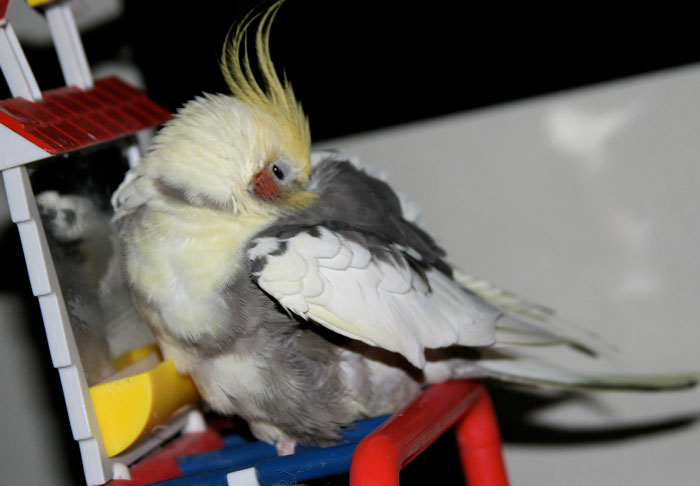
- If your bird goes through travel or temporary routine change, start following the usual sleep routine again. Adjusting takes no time, but the environment has to be similar to the previous environment and distraction-free.
- Since the change in the routine is already stressful for the bird, its cage shouldn’t be placed in a noisy area. Ensuring proper sleep at this stage will help the bird not get unnerved.
Ensuring these two tips are followed should be enough. Parrots are smart and are able to adjust to their previous routine in no time.
Identify and Address Sleep Disorders and a Few Sleep Management Techniques
While cockatiels can adjust from sleep disorders to normal routine changes fast, they can have other sleep-related problems from different causes. If you notice your bird being almost completely inactive in the daytime, check the following points for a possible cause. Chances are, one or more of these causes could be happening with the pet. Ensuring proper sleep is half the work of pet care.
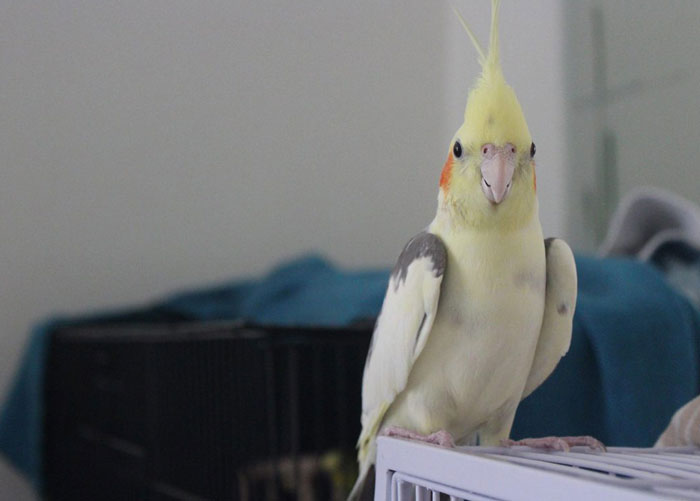
- Too high or too low a temperature will disrupt the cockatiel’s nighttime sleep, so try to cover it up in the daytime. There’s no specific measure of how much they should nap; it all depends on the bird’s activity levels. But if you notice for a while, you’ll get the idea.
- Variable bedtime is another problem. The time to go to sleep should be constant. Changes in that could disrupt bird psychology.
- The cage shouldn’t be crowded. It’ll result in excess noise, which will interrupt sleep for all the birds. Also, incompatible cage mates should be avoided.
- The bird should also get enough activity. A bird that sits inactive in the cage for a long time will naturally have a hard time getting deep sleep at night. It’ll, in turn, try to cover that sleep requirement by napping more in the daytime.
FAQs
Let’s discuss a few frequently asked questions about managing bird sleep habits.
Like other parrots, cockatiels need at least 10-12 hours of sleep daily.
A lack of sleep can make a cockatiel stressed out or weak. Oversleeping along with inactivity, can increase body fat levels in the bird. You should try to keep the bird active enough and check its sleep schedule regularly.
If you notice your cockatiel sleeping more or less than 10-12 hours daily, which is their usual requirement, it could be a sign of a problem. These birds might have night fright and may get scared if they hear a noise at night. They get scared and spend the night awake. Also, a stressed cockatiel will sleep less, while a fatigued or sick bird will sleep more than usual.
So, if you can keep the bird stress-free and their sleeping area silent, it’ll have a comfortable time sleeping. Also, if you notice weakness in your cockatiel, see if it has any disease and treat that accordingly.
Yes, routine or location change will affect a cockatiel’s sleep pattern but for a short time. When a cockatiel moves to a new owner’s home, it’ll spend a few weeks adjusting to the place and sleeping routine. Once cockatiel sleep habits get adjusted, there won’t be a problem anymore.
You can place a cover on top of the cockatiel’s cage to make its night environment completely dark. Just make sure to keep one side of the cage open for proper air movement, or use a breathable fabric. Some people like to keep a dim light near their cockatiel’s cage to protect them from getting night frights.
Final Words
So, you’ve read our guide about cockatiel sleep habits and hopefully have gotten some ideas on maintaining their sleep schedules. Remember, cockatiels are very popular because of their friendly and docile nature.
A healthy cockatiel can live for more than 20 years easily. It’s not that hard to ensure a proper sleep environment for a cockatiel if you maintain the things mentioned here: cage, light and noise; that should be enough. The better the bird can sleep, the better its activity levels and mood will be.
Cockatiels live a moderately long life. In fact, there was once a record of a captive cockatiel living for 32 years. In that sense, sleep, proper diet, and a good exercise routine can tremendously help their well-being.
You can learn more about this beautiful bird online and get some books on them. They’re a popular bird breed and have ample information online.
